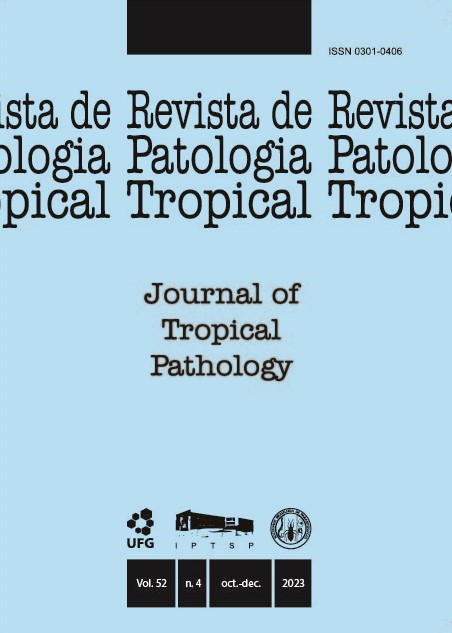Achatina fulica infected by Angiostrongylus cantonensis in Manaus, brazilian amazon region, and the risk of transmission of eosinophilic meningitis
DOI:
https://doi.org/10.5216/rpt.v52i4.77199Resumo
Angiostrongylus cantonensis, which causes the zoonosis Eosinophilic Meningitis (EM), has become increasingly widespread in Brazil. Terrestrial mollusks, especially the exotic giant African snail Achatina fulica, have being found naturally infected with this nematode besides some few freshwater species. In this study, we collected several terrestrial and one freshwater mollusks from five different localities in the city of Manaus, in the Brazilian Amazon Region. One hundred and eighteen specimens from nine different species were obtained. In all, 49 specimens were analyzed parasitologically, including A. fulica (42 specimens), Bulimulus sp. (one specimen) and the freshwater species Pomacea dolioides (five specimens). The other specimens died or were represented by shells. Specimens of A. fulica from one locality were found naturally infected with A. cantonensis, which was confirmed by phylogenetic analysis of mitochondrial MT-CO1 gene sequences. A recent case of EM reported in the Amazon region, in the city of Macapá, reinforces the need of effective surveillance of areas in which the parasite is known to occur, as well as raising the awareness of local populations at risk of infection. We highlight both the role of A. fulica in the transmission of A. cantonensis and the need for effective measures to control the spreading of EM in Brazil.
KEY WORDS: Mollusk; neural angiostrongyliasis; neurotropic parasite; intermediate host
Downloads
Downloads
Publicado
Como Citar
Edição
Seção
Licença
The manuscript submission must be accompanied by a letter signed by all authors stating their full name and email address, confirming that the manuscript or part of it has not been published or is under consideration for publication elsewhere, and agreeing to transfer copyright in all media and formats for Journal of Tropical Pathology.

